Selected Publications
Der Römerbrief. Rechenschaft eines Reformators
Gerd Theißen and Petra von Gemünden, Vandenhoeck & Ruprecht: Göttingen 2017, 560 pages.
Verkörperung als Paradigma Theologischer Anthropologie
Ed. by Gregor Etzelmüller, Annette Weissenrieder, De Gruyter: New York/ Berlin 2016, 350 pages.
Images of the Divine and Cultural Orientations. Jewish, Christian and Islamic Voices
Ed. by Michael Welker and William Schweiker, Evangelische Verlagsanstalt: Leipzig 2015.
Quests for Freedom. Biblical - Historical - Contemporary
Ed. by Michael Welker, Neukirchener Verlag: Neukirchen 2015, 406 pages.
Deutungsmacht. Religion und belief systems in Deutungsmachtkonflikten
Ed. by Philip Stoellger (Hg.), Mohr Siebeck: Tübingen 2014, 624 pages [Reihe: Hermeneutische Untersuchungen zur Theologie, Bd. 63].
Innovationen durch Deuten und Gestalten. Klöster im Mittelalter zwischen Jenseits und Welt
Ed. by Gert Melville, Bernd Schneidmüller and Stefan Weinfurter (Klöster als Innovationslabore. Studien und Texte 1), Schnell + Steiner: Regensburg 2014, 376 pages.
Money as God? The Monetization of the Market and the Impact on Religion, Politics, Law, and Ethics
Ed. by Jürgen von Hagen and Michael Welker, Cambridge University Press: Cambridge 2014 (Paperback 2016), 468 pages.
Rules and observance. Devising forms of communal life
Ed. by Mirko Breitenstein, Julia Burkhardt, Stefan Burkhardt and Jens Röhrkasten (Vita Regularis. Abhandlungen Bd. 60), LIT: Berlin 2014, 303 pages.
The Depth of the Human Person: A Multidisciplinary Approach
Ed. by Michael Welker, Eerdmans: Grand Rapid 2014, 406 pages.
The Science and Religion Dialogue: Past and Future
Ed. by Michael Welker, Peter Lang: Frankfurt u.a. 2014, 297 pages.
Un/sichtbar. Wie Bilder un/sichtbar machen
Ed. by Philip Stoellger, Königshausen & Neumann: Würzburg 2014, 312 pages [Reihe: Interpretation Interdisziplinär, Bd. 13].
Concepts of Law in the Sciences, Legal Studies, and Theology
Ed. by Michael Welker and Gregor Etzelmüller, Mohr Siebeck: Tübingen 2013, 395 pages.
Interdisziplinäre Anthropologie: Leib, Geist, Kultur
Ed. by Thiemo Breyer, Gregor Etzelmüller, Thomas Fuchs, Grit Schwarzkopf, Schriften des Marisilius Kollegs 10, Winter: Heidelberg 2013, 320 pages.
Der Römerbrief. Rechenschaft eines Reformators
Gerd Theißen and Petra von Gemünden, Vandenhoeck & Ruprecht: Göttingen 2017, 560 pages.
Vor dem Hintergrund der komplexen Anthropologie und Ethik des Apostels
Paulus lässt sich einer seiner wichtigsten Texte, der Römerbrief,
multiperspektivisch auslegen. Dies ist gerade angesichts der gegenwärtigen
exegetischen Debatte von Interesse. Die traditionelle lutherische Auslegung
legte den Römerbrief auf die Rechtfertigung des individuellen Menschen aus,
die seit den 70er Jahren des letzten Jahrhunderts dominierende new
perspective on Paul dagegen auf die soziale Öffnung der Gemeinde für alle
Menschen. Die von Profs. Gerd Theißen (Heidelberg) und Petra von Gemünden
(Augsburg) verfolgte Auslegung sucht nun nach einem breiteren Ansatz und
verbindet bildsemantische, diskursanalytische, psychologische und soziale
Perspektiven.
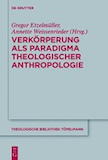
Verkörperung als Paradigma Theologischer Anthropologie
Ed. by Gregor Etzelmüller, Annette Weissenrieder, De Gruyter: New York/ Berlin 2016, 350 pages.
- Thiemo Breyer
Philosophie der Verkörperung Grundlagen und Konzepte 29 - Bernd Janowski
Die lebendige næpæš: Das Alte Testament und die Frage nach der „Seele“ 51 - Annette Schellenberg
„Mein Fleisch ist gekleidet in Maden und Schorf“ (Hi 7,5): Zur Bedeutung des Körpers im Hiobbuch 95 - Andreas Wagner
Verkörpertes Herrschen: Zum Gebrauch von „treten“/„herrschen“ in Gen 1,26–28 127 - Martin Rösel
Den Herrn aus ganzem Denken lieben (Dtn 6,5 LXX):
„Entkörperung“ in der griechischen Übersetzung des Alten Testaments? 143 - Gerd Theißen
Verkörperung als Botschaft: Transformative Religion und Theologie im Urchristentum 159 - Annette Weissenrieder
Verkörperung des inneren Menschen?
2. Korinther 4,16 im Lichte antiker medizinischer und philosophischer Traditionen 183 - Gregor Etzelmüller
Verkörperung als Paradigma theologischer Anthropologie 219 - Gesche Linde
Verkörperung, Handlung, Repräsentation: Ein interpretationstheoretischer Vorschlag 243 - Philipp Stoellger
Vom dreifaltigen Sinn der Verkörperung – im Blick auf die Medienkörper des Geistes 289 - Michael Welker
Was kann theologische Rede von Inkarnation und Auferstehung zur Anthropologie beitragen? 317
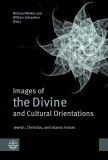
Images of the Divine and Cultural Orientations. Jewish, Christian and Islamic Voices
Ed. by Michael Welker and William Schweiker, Evangelische Verlagsanstalt: Leipzig 2015.
Part I
Divine Invisibility and Power
- Invisibility and Power in Islamic Religion and Culture: The Ambiguity of Veiling
Baber Johansen, Harvard - In the Image of the Invisible
Kathryn Tanner, Yale - Is Seeing Believing? ‘Visibility’ and ‘Self Concealment’ of God in Jewish Theology after the Holocaust
Alfred Bodenheimer, Basel
Part II
Spiritual Transformation and the Divine
- Images of the Divine and Spiritual Transformation in Judaism
Michael Fishbane, Chicago - Between Sensual and Heavenly Love
Franz Rosenzweig’s Reading of the Song of Songs
Paul Mendes-Flohr, Chicago - God Sharing in the Conditio Humana - Reflections on the Potential of Christian Imagery from a Lutheran Perspective
Friederike Nüssel, Heidelberg - Image of the Divine and Spiritual Presence - In What Ways Can Christology Provide Cultural Orientations?
Michael Welker, Heidelberg - The Forces of Good and Evil in ‘Islamic’ Comic
Susanne Enderwitz, Heidelberg - Re-Thinking Jewish/Christian Divergence on the “Image of the Divine” -
The Problem of Intra-Divine Complexity and the Origins of the Doctrine of the Trinity
Sarah Coakley, Harvard/ Cambridge, UK
Part III
The Divine and the Elevation of Life
- ‘God as Light’ in the Christian Moral Imagination
William Schweiker, Chicago - Paradise as a Qur’anic Discourse
Late Antique Foundations and Early Qur’anic Developments
Angelika Neuwirth, Berlin - “So that he could not bear the sweetness” - Imagining the Unimaginable in Medieval Ashkenaz
Johannes Heil, Heidelberg - Islam as a Cultural Orientation for Modern Judaism
Susannah Heschel, Dartmouth - Christology - The Images of the Divine in USA and South African Black Theology
Dwight Hopkins, Chicago
Quests for Freedom. Biblical - Historical - Contemporary
Ed. by Michael Welker, Neukirchener Verlag: Neukirchen 2015, 406 pages.
1. FREEDOM AND DOMINATION
1.1 A Blight On The Nation - Slavery In Today’s America
Ron Soodalter, New York
1.2 “To be a Free Nation” - Myth, Ritual, and Ethics of Freedom in the Old Testament as Political Encouragement
Manfred Oeming, Heidelberg
1.3 Slave Wo/men and Freedom in the Pauline Tradition - Some Methodological Reflections
Elisabeth Schüssler Fiorenza, Harvard
1.4 The Paradox of Freedom - Mary, the Manhattan Declaration and Women’s Submission to Childbearing
Katharina von Kellenbach, Maryland
2. SELF-DETERMINATION AND CONCEPTS OF FREEDOM
2.1 What it is to be Free
Rüdiger Bittner, Bielefeld
2.2 Concepts of Freedom in Antiquity Pagan Philosophical Traditions in the Greco-Roman World
Peter Lampe, Heidelberg
2.3 Two Meanings of Freedom in the Eastern Patristic Tradition
Cyril Hovorun, Yale
2.4 Freedom, Sin and Evil - Lutheran Meditations
Risto Saarinen, Helsinki
2.5 Protestant Concepts of Freedom and Their Foundations in Biblical Traditions
Friederike Nüssel, Heidelberg
3. FREEDOM AS GIVEN AND SHAPED BY GOD
3.1 God’s Work for Human Freedom
Patrick D. Miller, Princeton
3.2 Freedom in Apocalyptic Perspective A Reflection on Paul’s Letter to the Romans
Beverly Roberts Gaventa, Princeton
3.3 Freed by Love and for Love - Freedom in the New Testament
L. W. Hurtado, Edinburgh
3.4 The Innovative Concept of Freedom in Paul
Hans-Joachim Eckstein, Tübingen
4. FREEDOM AS ETHOS OF BELONGING
4.1 Concepts of Freedom in Deuteronomy?
Jan Christian Gertz, Heidelberg
4.2 Potentials for Freedom in Concepts of Order - Transformations of Wisdom and Political Theology in the Hebrew Bible
Jürgen van Oorschot, Erlangen
4.3 Freedom in Community - “Surprising Discovery” and “Paradoxical Connection”?
Dirk J. Smit, Stellenbosch
4.4 Concepts of Freedom in the Czech Reformation
Jindřich Halama, Prag
5. THE DIALECTICS OF FREEDOM AND MODERNITY
5.1 Freedom and Commitment - Christian Tradition and Liberal Humanism
Carver T. Yu, Hong Kong
5.2 Freedom in Postcolonial Perspective
Susan Abraham, Loyola, CA
5.3 Freedom and Human Rights - The Cosmopolitan Context of the Justification of Rights in Roman Catholicism
Francis Schüssler Fiorenza, Harvard
5.4 Divine Spirit and Human Freedom
Michael Welker, Heidelberg
Deutungsmacht. Religion und belief systems in Deutungsmachtkonflikten
Ed. by Philip Stoellger, Mohr Siebeck: Tübingen 2014, 624 pages [Reihe: Hermeneutische Untersuchungen zur Theologie, Bd. 63].
- Philipp Stoellger: Deutungsmachtanalyse. Zur Einleitung in ein Konzept zwischen Hermeneutik und Diskursanalyse
I. Theorien
- Heiner Hastedt: Was ist 'Deutungsmacht'? Philosophische Klärungsversuche
- Emil Angehrn: Die Differenz des Sinns und der Konflikt der Interpretationen
- Werner Stegmaier: Von Religionsstiftern lernen: Deutungsmacht als Kraft zur Orientierung
- Marc Rölli: Wissen und Verstehen. Zur Analyse der Macht epistemischer und hermeneutischer Strukturen
- Burkhard Liebsch: Interpretationsmacht. Macht der Interpretation und Interpretation der Macht − in der Perspektive einer Revision des Politischen
II. Schriften
- Eckart Reinmuth: Performativität und Gewalt im Hebräerbrief
- Marius Timmann Mjaaland: Der apokalyptische Zwerg der Revolution
- Jens Wolff: The Power of Philology Between Sacralisation and Poetic and Aesthetic Semi-Secularisation
- Philip Manow: Der politische Kampf um theologische Deutungsmacht – das Ende der Divine Right Doctrine und der protestantische Ikonoklasmus im Englischen Bürgerkrieg
III. Geister
- Gesa Mackenthun: Fossils and Immortality. Geological Time and Spiritual Crisis in Nineteenth-Century America
- Klaus Hock: Der entgeisterte Blick: Geist(er)besessenheit im Religionsdiskurs. Übergänge – Bruchlinien – Verschränkungen
IV. Mythen
- Stephanie Wodianka: Nur ein Mythos? Konfliktpotentiale des Mythischen in der Moderne
- Yves Bizeul: Der Kampf um die Deutungsmacht in der Spätmoderne am Beispiel des Mythos des Clash of Civilizations
V. Recht, Ökonomie und Gesellschaft
- Peter A. Berger: Bilder sozialer Ungleichheit. Zur Versozialwissenschaftlichung sozialer Deutungsmuster
- Birger P. Priddat: Oeconomia perennis. Drei Stationen der Geburt der Ökonomie aus der Theologie. Wechsel der Deutungsmacht –
- Hans Michael Heinig: Deutungsmachtkonflikte als Deutungs- und Machtkonflikte im Religionsrecht
Innovationen durch Deuten und Gestalten. Klöster im Mittelalter zwischen Jenseits und Welt
Ed. by Gert Melville, Bernd Schneidmüller and Stefan Weinfurter (Klöster als Innovationslabore. Studien und Texte 1), Schnell + Steiner: Regensburg 2014, 376 pages.

Money as God? The Monetization of the Market and the Impact on Religion, Politics, Law, and Ethics
Ed. by Jürgen von Hagen and Michael Welker, Cambridge University Press: Cambridge 2014 (Paperback 2016), 468 pages.
I. Money and Markets: Economic, Legal, and Theological Foundations
- Jürgen von Hagen, Bonn
Microeconomic Foundations of the Use of Money - Peter Bernholz, Basel
Money, its Role in a Decentralized Market Economy, and its Influence on Society - Wolfgang Ernst, Oxford
Mensura et Mensuratum. Money as Measure and Measure for Money - Burkhard Hess, MPI Luxemburg
Standardization and Monetization – Legal Perspectives. Heidelberg - Michael Welker, Heidelberg
Kohelet and the Co-evolution of a Monetary Economy and Religion
II. Monetary Exchange: Historical and Social Roots
- Tonio Hölscher, Heidelberg
Money and Image: The Presence of the State on the Routes of the Economy - Leong Seow, Princeton
The Social World of Ecclesiastes - Rudolf G. Wagner, Heidelberg
Fate’s Gift Economy: The Chinese Case - Hans Ulrich Vogel, Tübingen
“Mothers and Children,” Discourses on Paper Money During the Song Period” - Berndt Hamm, Erlangen
“Buying Heaven"
III. Monetary Exchange: Ethical Limits and Challenges
- Konrad Schmid, Zürich
The Monetization and Demonetization of the Human Body: Compensatory Payments for Bodily Injuries and Homicide in Ancient Near Eastern and Ancient Israelite Law Books - Günter Thomas, Bochum
What is Life’s Monetary Value? Ethical Observations on the Limits of Law in a Case of Transitional Justice - Piet Naudé, Stellenbosch
The Standardized Monetization of the Market and the Impact on Current Conceptions of Justice - Shining Gao, Peking
Religious faith and the Market Economy – A Survey on Faith and Trust of Catholic Entrepreneurs in China
IV. Money, Wealth, and Desire
- Andreas Schüle, Leipzig
Do not Sell Your Soul for Money: Economy and Eschatology in Biblical and Intertestamental Traditions - Edmondo Lupieri, Chicago
“Businessmen and Merchants Will Not Enter the Places of My Father” – Early Christianity and Market Mentality - John F. Hoffmeyer, Philadelphia
Desire in Consumer Culture: Theological perspectives from Gregory of Nyssa and Augustine of Hippo
Rules and observance. Devising forms of communal life
Ed. by Mirko Breitenstein, Julia Burkhardt, Stefan Burkhardt and Jens Röhrkasten (Vita Regularis. Abhandlungen Bd. 60), LIT: Berlin 2014, 303 pages.

The Depth of the Human Person: A Multidisciplinary Approach
Ed. by Michael Welker, Eerdmans: Grand Rapid 2014, 406 pages.
- Introduction
Michael Welker
I. Person and Personhood: Introductory Questions
- Why Is Personhood Conceptually Difficult?
Andreas Kemmerling - Flesh–Body–Heart–Soul–Spirit: Paul’s Anthropology as an Interdisciplinary Bridge-Theory
Michael Welker - Emergence, the Quest for Unity, and God: Toward a Constructive Christian Theology of the Person
Philip Clayton
II. Scientific Perspectives in Interdisciplinary Dialogues
- Towards an Integrated Anthropology
John C. Polkinghorne - Brains, Minds, Souls, and People: A Scientific Perspective on Complex Human Personhood
Malcolm Jeeves - The Emergence of Human Distinctiveness
Warren S. Brown - Hierarchical Selection and the Evolutionary Emergence of “Spirit”
Jeffrey P. Schloss
III. Sources of the Christian Traditions in Historical and Global Contexts
- “Soul” and “Spirit” in the Anthropological Discourse of the Hebrew Bible
Andreas Schüle - Sarx, Soma, and the Transformative Pneuma: Personal Identity Endangered and Regained in Pauline Anthropology
Gerd Theissen - Augustine’s Aporetic Account of Persona and the Limits of Relatio: A Reconsideration of Substance Ontology and Immutability
Volker Henning Drecoll - Augustine’s Investigation into Imago Dei
Eiichi Katayanagi - The Affects of the Soul and the Effects of Grace: On Melanchthon’s Understanding of Faith and Christian Emotions
Markus Höfner - The Concept of “Body” in Indian Christian Theological Thought
Origen V. Jathanna
IV. Contemporary Theological, Ethical, and Interdisciplinary Challenges
- The Dignity of Human Personhood and the Concept of the “Image of God”
Bernd Oberdorfer - Human Dignity and the Concept of Person in Law
Stephan Kirste - On the Relation of Personhood and Embodiment
Frank Vogelsang - Can Ethics Be Fully Naturalized?
Maria Antonaccio - Beyond Distinct Gender Identities: The Social Construction of the Human Body
Isolde Karle - Moral Inwardness Reconsidered
William Schweiker - Human Personhood at the Edges of Life: Medical Anthropology and Theology in Dialogue
Günter Thomas
The Science and Religion Dialogue: Past and Future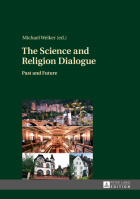
Ed. by Michael Welker, Peter Lang: Frankfurt u.a. 2014, 297 pages.
I. Celebrating the Past – Shaping the Future
- The Science and Religion Dialogue: Past and Future
Thomas Pfeiffer (Vice-Rector of the University of Heidelberg) - The Science and Religion Dialogue: Past and Future
Michael Welker (Director of the FIIT, University of Heidelberg) - Opening Address
John M. Templeton, Jr (President and Chairman of the John Templeton Foundation) - Commemorating Sir John Templeton (1912-2012)
Stephen Post (Stony Brook University) - Science and Religion Dialogue
Michael Murray (Vice President of the John Templeton Foundation)
II. On the Engagement of Science and Religion
- The Natural History of Religion
Hans Joas (University of Freiburg and University of Chicago) - God and Evolution
Martin A. Nowak (Harvard University) - The Search for Truth
John Polkinghorne (Cambridge University)
III. The Science and Theology Dialogue I: Multi-Years Research Projects
- A Contribution to the Eschatology Session
John Polkinghorne (Cambridge University) - Eschatology, Anthropology, and Concepts of Law
Michael Welker (University of Heidelberg) - The Faraday Institute for Science and Religion – the First Seven Years Denis R. Alexander (Cambridge University)
- Theological Inquiry and the Science and Religion Dialogue
Friederike Nüssel (University of Heidelberg / CTI Princeton), Robin Lovin (Southern Methodist University / CTI Princeton) - Science and Redemption: The Future of Creation
Ted Peters (Pacific Lutheran Theological Seminary and CTNS, Berkeley) - Scientific Cosmology and the Theologies of Creation and Redemption Robert John Russell (CTNS, Berkeley)
IV. The Science and Theology Dialogue II: Multicontextual Dimensions
- The Dialogue between Science and Religion in Russia
Cyril Hovorun (Theological Academy of Kiev) - The Role of Thought Experiments in Science and Religion
Niels Henrik Gregersen (University of Copenhagen) - A Postfoundationalist Approach to Theology and Science
J. Wentzel van Huyssteen (Princeton Theological Seminary) - Insiders and Outsiders in ‘Religion and Science’
Willem B. Drees (Leiden University)
V. Astronomy and Mathematics
- Cosmology and the Human Condition
Chris Impey (University of Arizona) - Note on Formal Reasoning in Theology
Matthias Baaz (Vienna University of Technology)
VI. Physics and Biology
- The Search for Evidence-Based Reality
G. A. D. Briggs (Oxford University) - If the Evolution of Intelligence is Inevitable, then What are the Metaphysical Consequences?
Simon Conway Morris (Cambridge University) - The Use of Metaphors when Talking about the Nature of Organisms
Günter P. Wagner (Yale University)
VII. Religious Ethics and Philosophical Theology
- Atheism and Analytical Thinking
Kelly James Clark (Calvin College) - Freedom within Religion. Religious Ethics and Social Life
William Schweiker (University of Chicago)
VIII. Philanthropic Investment and the Future Generations: Three (of Sixty) Winners of the John Templeton Award for Theological Promise (2007-2011)
- The Templeton Award and Professional Development for Young Scholars
Jan Stievermann (University of Heidelberg) - “The Divine Fire in All Things” – Orthodox Cosmology in Dialogue with Science
Daniel Munteanu (Valahia University, Targoviste) - God’s Spirituality – The Trinitarian Dynamics of Prayer
Eva Harasta (University of Vienna)
Un/sichtbar. Wie Bilder un/sichtbar machen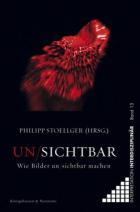
Ed. by Philip Stoellger, Königshausen & Neumann: Würzburg 2014, 312 pages [Reihe: Interpretation Interdisziplinär, Bd. 13].
- P. Stoellger: Einleitung: Die Spur der Hand im Bild oder: was und wie Bilder unsichtbar machen
A. Sichtbare Unsichtbarkeit - im Horizont invisibler Transzendenz
- E. Reinmuth: Parodien der Macht (Un-)Sichtbares in der Johannesapokalypse
- J. Haga: Christology and anthropology. The understanding of man by Luther and in the Renaissance
- J. Wolff: Die Hand des Unsichtbaren. Perikopenlyrik und kasuelle Individuallyrik im Barock
- M. Firchow: Die unsichtbare Hand in der Schöpfung. Überlegungen zur (Un-)Sichtbarkeit von Gott und Chaos
- M. Kumlehn (A) / T. Klie (B): Seh- und Spielarten der Dynamik des Unsichtbaren als Impulse (religiöser) Bildungsprozesse
- P. Stoellger: Der Preis der Prägnanz und die Schatten der Evidenz. Was Gottes- und Menschenbilder un/sichtbar machen
B. Unsichtbare Sichtbarkeit - im Horizont visibler Immanenz
- N. Söll: Risse in der Decke, (In)Visibilisierungsstrategien im Werk des Künstlers Banks Violette
- J. Daubenberger: Die Ambivalenz der Tätowierung. Verschleierung des Körperlichen, Betonung des Körperlichen
- A. Klawitter: Sichtbare Bilder des unsichtbaren Denkens. Betrachtungen zu Velázquez, Manet und Magritte
- G. Meynen: Kulturtechniken der Anpassung. Über das Prothesenproblem und den Medienbegriff von Marshall McLuhan
- R. Dennhardt: Die „unsichtbare Hand“ der Technologie. Der elektronische Schaltplan und sein Eigenleben
- A. Jael Lehmann: Der Blick von Oben. Fernerkundung als Visualisierungsstrategie
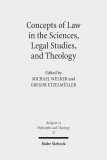
Concepts of Law in the Sciences, Legal Studies, and Theology
Ed. by Michael Welker and Gregor Etzelmüller, Mohr Siebeck: Tübingen 2013, 395 pages.
1. Laws of Nature
- John Polkinghorne: Introduction
- John Polkinghorne: The Character of the Laws of Nature
- Jörg Hüfner: Origins of the Concept Law of Nature
- Nicolaidis Agyris: The Laws of Nature and the Nature of Laws
- Judy Wornat: Polycyclic Aromatic Hydrocarbons: A Case Study in the Laws of Natural Science
- Je Schloss: Laws of Life?
- Niels Henrik Gregersen: From Laws of Nature to Nature's Capacities: A Theological Thought Experiment
2. God's Laws and Human Laws in Biblical Traditions
- Michael Welker: Introduction
- Konrad Schmid: The Genesis of Normativity in Biblical Law
- Patrick Miller: “That You May Live:” Dimensions of Law in Deuteronomy
- Gregor Etzelmüller: Law and Ritual: The Power of Cultic Regulations in the Old Testament to Shape Christian Liturgical History
- Matthias Konradt: Law, Salvation and Christian Identity in Paul and Matthew
- Michael Welker: Justice-Mercy-Worship: The “Weighty Matters” of Biblical Law
3. Laws in Reformation Theology and Modern Legal and Political Evolution
- John Witte: Introduction
- Christoph Strohm: Philosophical, Juridical and Scientific Arguments in Protestant Concepts of Law
- Mathias Schmoeckel: Education by Means of Law: The Reformation and the Idea of Codi cation
- John Witte: A Demonstrative Theory of Natural Law: Johannes Althusius and the Rise of Calvinist Jurisprudence
- Harold J. Berman: Integrative Jurisprudence
4. Moral Laws and Moral Skepticism
- Christiane Tietz/Gregor Etzelmüller: Introduction
- Wentzel van Huyssteen: Construction and Constraint: What Do the Laws of Nature Teach Us about Moral Laws?
- Rüdiger Bittner: Without Laws
- Christiane Tietz: Why Should Naturally Given Moral Laws Exist? Reconsidering Theological Arguments for Natural Laws
- Wang Liuer: Natural Law and Chinese Traditions
Interdis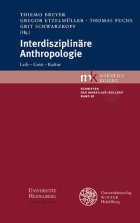
ziplinäre Anthropologie: Leib, Geist, Kultur
Ed. by Thiemo Breyer, Gregor Etzelmüller, Thomas Fuchs, Grit Schwarzkopf, Schriften des Marisilius Kollegs 10, Winter: Heidelberg 2013, 320 pages.
I Leib
- THOMAS FUCHS
Verkörperung, Sozialität und Kultur - HANS-PETER KRÜGER
Embodiment und Embedding in der personalen Lebensführung. Aus Sicht der Philosophischen Anthropologie - MICHAEL WELKER
Was ist ein „geistiger Leib“?
II Geist
- ANDREAS DRAGUHN
Animal rationale? Das Gehirn als Geist-Organ - MAGNUS SCHLETTE
Leben in Farben. Sprachkritische Vorüberlegungen zur Anthropologie der Wahrnehmung - STEFANIE HÖHL & SABINA PAUEN
Evolutionäre Ansätze zum Wissenserwerb in der frühkindlichen Entwicklung
III Kultur
- MIRIAM HAIDLE
Die Evolution kultureller Kapazitäten – paläoanthropologische Ansätze - STEFAN BECK
Embodiment and Emplacement of Cognition – praxistheoretische Perspektiven - TERRENCE W. DEACON
Der Begriff des Symbols
IV Interdisziplinäre Anthropologie
- STEFANO MICALI
Negative oder differentielle Anthropologie? Eine Auseinandersetzung mit den anthropologischen Untersuchungen Theunissens aus methodologischer Sicht - GREGOR ETZELMÜLLER
Leib, Seele, Umwelt. Die interdisziplinäre Anthropologie Viktor von Weizsäckers und ihr Verhältnis zur paulinischen Anthropologie

